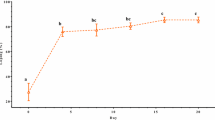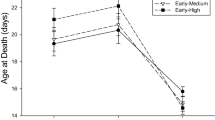Abstract
We examined the costs associated with acclimation in an omnivorous mouse (Phyllotis darwini) fed two contrasting diets (carbohydrate-rich and protein-rich). We studied the response of gut morphology and digestive performance in animals shifted to a novel diet at different developmental stages. When acclimated adult animals were shifted to the alternative diet, energy digestibility decreased. We also found long-term consequences to diet acclimation. Animals reacclimated for 15 days to an alternative diet did not increase digestive performance. Although no effects of diet on gut morphology were noted, a significant positive correlation between energy digestibility and small intestinal length was found, explaining most of the variability observed in energy digestibility. These results suggest that caution should be used when defining adaptive changes if the possible cost of acclimation is neglected.
Similar content being viewed by others
Author information
Authors and Affiliations
Additional information
Accepted: 18 May 2000
Rights and permissions
About this article
Cite this article
Sabat, P., Bozinovic, F. Digestive plasticity and the cost of acclimation to dietary chemistry in the omnivorous leaf-eared mouse Phyllotis darwini . J Comp Physiol B 170, 411–417 (2000). https://doi.org/10.1007/s003600000118
Issue Date:
DOI: https://doi.org/10.1007/s003600000118
- AbbreviationsAA-N enzymatic activity of aminopeptidase-N
- As enzymatic activity of sucrase
- CHO carbohydrate-rich
- CHO-acclimation group experimental group acclimated to a carbohydrate-rich diet
- CHO-to-PRO-reacclimation group experimental group acclimated to a carbohydrate-rich diet, and then switched to protein-rich diet in the adult stage for 15 days
- Lsi length of small intestine
- Lli length of large intestine
- mb body mass (g)
- PRO protein-rich
- PRO group experimental group acclimated to a protein-rich diet




